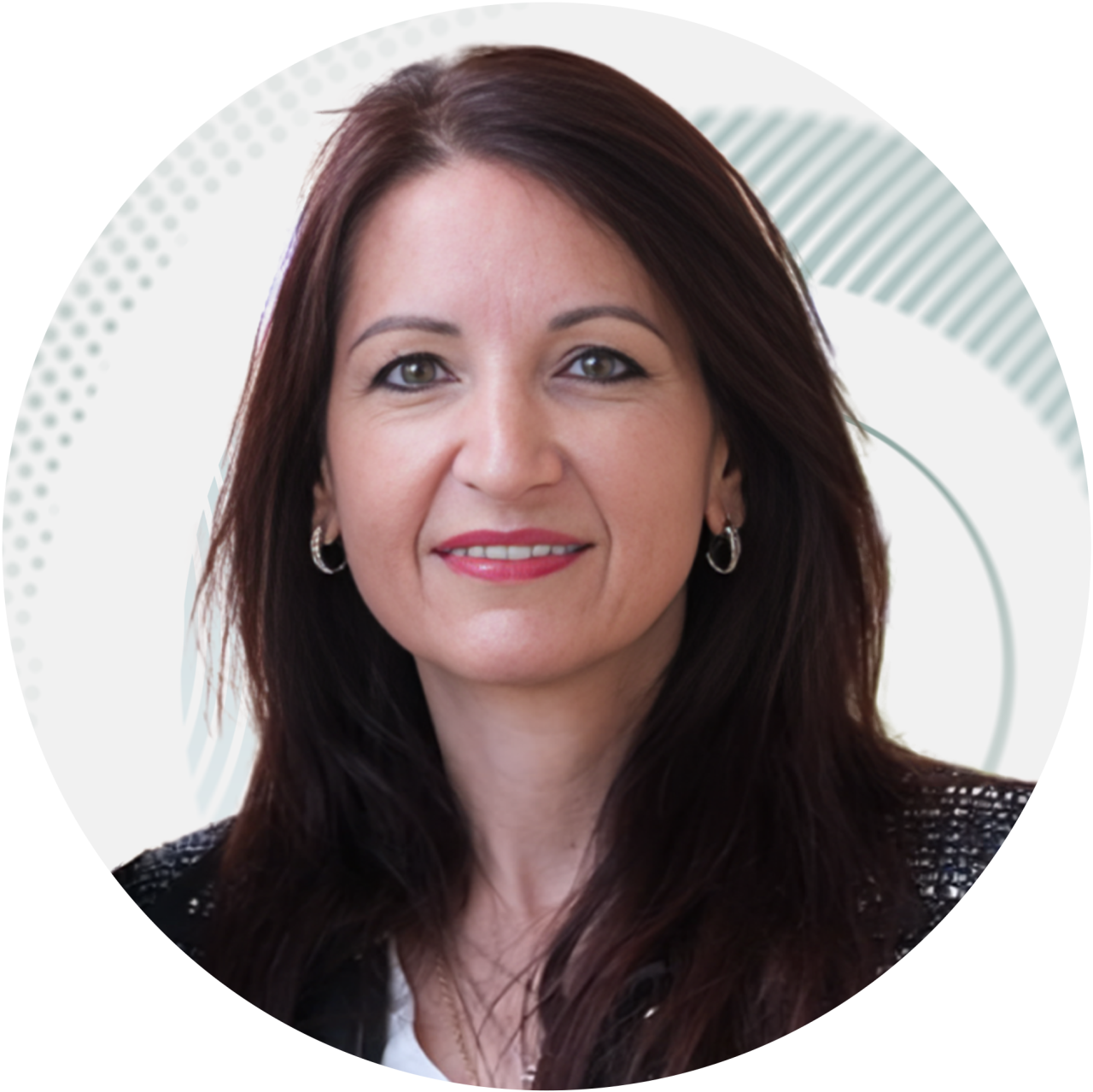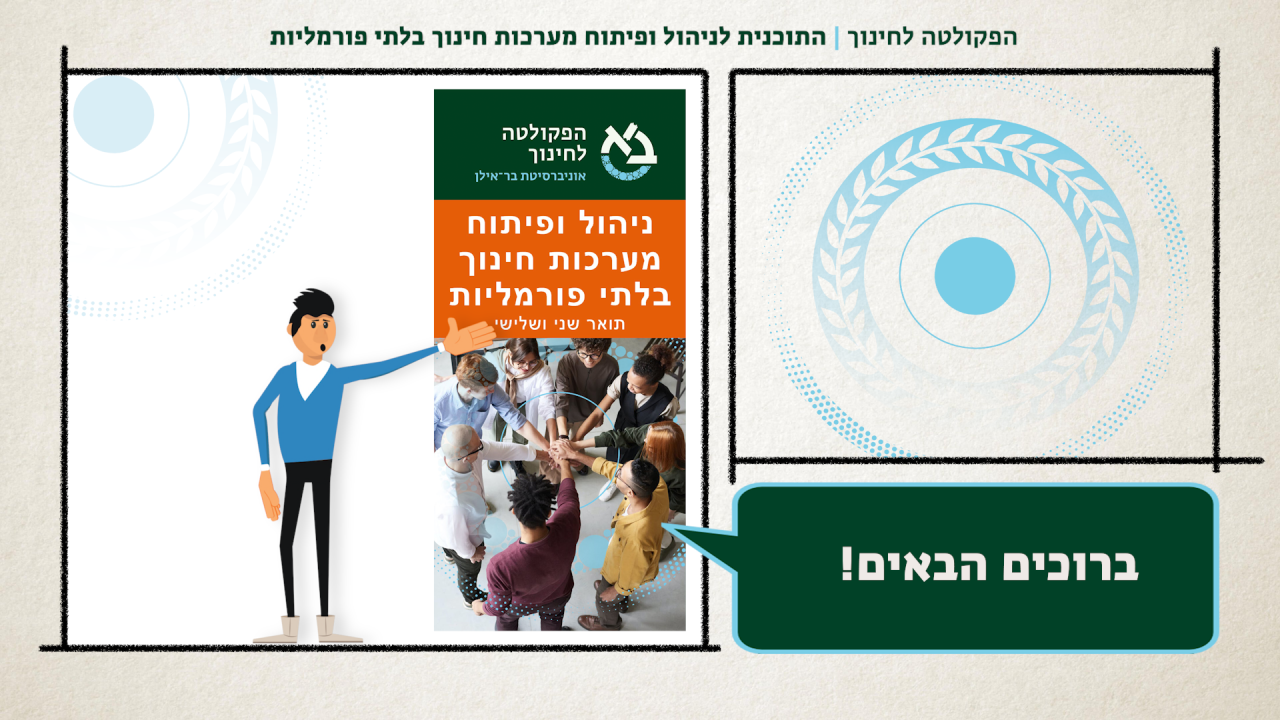מנהיגות וניהול מערכות חינוך | המגמה לחינוך בלתי פורמלי: קהילה ונוער
 למידע נוסף והרשמה השאירו פרטים
למידע נוסף והרשמה השאירו פרטיםזמינים למענה על שאלות וייעוץ בדוא"ל או דרך עמוד יצירת קשר
צרו איתנו קשר פנו אלינו לקבלת מידע נוסף בנושא לימודי מנהיגות וניהול מערכות חינוך - המגמה לחינוך בלתי פורמלי: קהילה ונוער
לרישום מקוון ניתן להיעזר במרכז השירות והגיוס 9392*
מנהיגות וניהול מערכות חינוך | המגמה לחינוך בלתי פורמלי: קהילה ונוער
תוכנית לימודים לתואר שני ושלישי

ראש התוכנית: פרופ' פסקל בן עוליאל | pascale.benoliel@biu.ac.il
ראשת המגמה: פרופ' יניב אפרתי | yaniv.efrati@biu.ac.il
מתאמת התוכנית: גב' חן גולן | leadership.edu@biu.ac.il
מנהיגות וניהול מערכות חינוך | המגמה לחינוך בלתי פורמלי: קהילה ונוער מטרת המגמה היא להכשיר סגל בכיר לניהול מערכות חינוך בלתי פורמליות במתנ"סים, תנועות נוער וגופים חינוכיים התנדבותיים שונים, סגל המסוגל לבצע מחקר ורפלקציה על עבודתו המעשית. תוכנית לימודי מנהיגות וניהול מערכות חינוך | המגמה לחינוך בלתי פורמלי: קהילה ונוער שמה לה למטרה להעמיק את הידע התיאורטי, המחקרי והיישומי בשלושה תחומים: א. ניהול – שיטות ניהול עתידיות והשפעתן על חינוך בלתי פורמלי, סדנת ניהול יזמות, התנדבות ומעורבות חברתית, ניהול סימולציות וחינוך לרב תרבותיות בחברות >> ניתן לשלב לימודי תעודת 'קורס דירקטורים מתקדם למנהיגים במערכות חינוך' מטעם אוניברסיטת בר-אילן בשיתוף SRI GLOBAL GROUP. לפרטים על קורס דירקטורים מתקדם ניתן לשלב למידה של סמסטר בחו"ל לקבלת מידע נוסף בנושא לימודי מנהיגות וניהול מערכות חינוך במגמה לחינוך בלתי פורמלי: קהילה ונוער פנו אלינו דרך עמוד צור קשר |
תוכנית הלימודים תוכנית הלימודים למגמת חינוך בלתי פורמלי: קהילה ונוער הינה מובנית ומתפרסת על פני שנה וחצי (במשך 3 סמסטרים) או שנה ברצף (2 סמסטרים):
בנוסף, מחויבים הסטודנטים בדרישות לימודי יסוד ביהדות ואנגלית כמפורט באתר הוועדה לתואר שני. *ייתכנו שינויים בתוכנית הלימודים ובימי הלימוד קובץ תוכנית לימודיםבלתי פורמלי - שנה אחת - מתקבלי תשפ"ו |
מלגה על שם סא"ל מחמוד ח'יראלדין - לימודים לאנשי מערכות הביטחון וצה"ל מרכז אקדמי: ד"ר אמל עאמר | aml.amer@biu.ac.il המסלול על שם סא"ל מחמוד ח'יראלדין הינו פרויקט חדש משותף בין הפקולטה לחינוך לבין מינהל אוכלוסיות ואגף כוח האדם בצה"ל. שיתוף פעולה זה נועד לחזק את גיוסם והשתלבותם של בני המיעוטים בצה"ל ובהשכלה הגבוהה, במיוחד בלימודים לתואר שני בתחום המנהיגות והניהול של מערכות חינוך. סא"ל מ - מחמוד ח'יראלדין מחמוד ח'יראלדין, נולד ב- 28.12.1977, גדל בכפר הדרוזי חורפיש והתחנך בפנימייה הצבאית לפיקוד הריאלי בחיפה. סא"ל מ' היה קצין דרוזי-ישראלי בסיירת מטכ"ל השייכת למערך המבצעים המיוחדים של אמ"ן, בדרגת סגן-אלוף. נהרג במבצע סודי בח'אן יונס, בשל תפקידו הסודי שמילא, במשך למעלה משלוש שנים לאחר מותו זהותו ומקום קבורתו וכל מידע מזהה אחר היו חסויים, ולכן כונה בתקשורת בשם סא"ל מ' עד שנת 2022, אז הותרו הפרטים לפרסום. על פועלו במבצע עוטר לאחר מותו בצל"ש הרמטכ"ל. במקביל לשירותו הצבאי הקים סא"ל מ' יחד עם עוד מספר חברים קבוצת 'אחריי' במגזר הדרוזי, ארגון מנהיגות דרוזית אופקים לעתיד ועוד. כמו כן, למד במסלול האקדמי במכללה למנהל, והיה בעל תואר ראשון ושני תארים שניים, המיוחד מבין התארים השניים היה במנהיגות ומדיניות בחינוך, וזאת מתוך רצון להשתלב לאחר פרישתו מצה"ל במערכת החינוך כמנהל בית ספר. ה"מוטו" שלו היה: להשפיע זה להוביל קהל יעד מלגה לתלמידי תואר שני על שם סא"ל מ' מידע נוסף
לסטודנטים במסלול על שם סא"ל מ' אפשרות לשלב סמסטר אחד בחו"ל על בסיס מענק מקרן אירופית (ארסמוס) תוך הכרה בקורסים! ניתן לשלב לימודי תעודה 'קורס דירקטורים מתקדם למנהיגים במערכות חינוך' מטעם אוניברסיטת בר אילן בשיתוף SRI GLOBAL GROUP. לפרטים על קורס דירקטורים מתקדם על הסטודנטים במסלול על שם סא"ל מ' ללמוד תוכנית לימודים מלאה ולעמוד בכל חובות הלימוד לאורך הלימודים. קורסי התוכנית נלמדים בקמפוס באופן היברידי (בקמפוס ומרחוק). במסלול עם תזה, נדרש לשריין שנתיים לסיום עבודת התזה.
|
תנאי קבלה
|
אופן הרישום
טופס המלצה אקדמית רצוי המלצות ממרצה בקורס אקדמי (עדיפות לסמינריון). טופס המלצת מעסיק המלצה מגורם מקצועי שמכיר את המועמד/ת מהתנסות בשדה. על ההמלצות להגיע ישירות מהממליצים ולא באמצעות המועמדים לקבלה. יש להעביר לממליצים את טופס ההמלצה עם פרטי המועמד ממולאים בתחילת ההמלצה. ***אלו הן דרישות מינימום ואין בהן התחייבות לקבל כל מועמד העומד בתנאים אלה.*** לכל לשאלה נוספת בעניין תהליך הרישום ללימודי מנהיגות וניהול מערכות חינוך - מגמת קהילה ונוער, פנו למתאמת התוכנית בכתובת leadership.edu@biu.ac.il |
לפרטים נוספים וקבלת קהל לקבלת מידע נוסף בנושא לימודי מנהיגות וניהול מערכות חינוך - מגמת קהילה ונוער או להרשמה פנו אלינו דרך עמוד צור קשר לפרטים נוספים ניתן לפנות למתאמת התוכנית חן גולן בטלפון 03-5318444 | leadership.edu@biu.ac.il ”דלת פתוחה“ בימים א‘, ג‘, ה‘ בשעות 12:00-10:00 בזום ובאופן פרונטלי |
סרטון על התוכנית |
סגל אקדמי חברי הסגל במגמת חינוך בלתי פורמלי: קהילה ונוער הינם חוקרים בעלי שם בתחומם אשר עוסקים במגוון רחב של נושאים ומציעים תכנית לימודים מקיפה ומעשירה. התוכנית קושרת בין ממצאי המחקר העדכני בארץ ובחו"ל לבין אפשרויות הטמעתם בשטח. |
Last Updated Date : 29/01/2026




